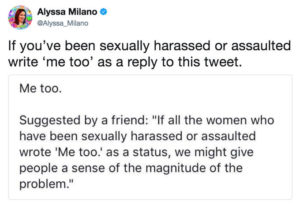Note: this blog post contains difficult material and may bring up difficult emotions for some people. If you find yourself needing support, please contact Rocky Mountain Crisis Partners’ crisis line at 844.493.TALK (8255). If you aren’t in crisis but need support and/or would rather speak to a peer, hit * when you call. If you would like to talk to someone specifically about sexual assault, please contact the National Sexual Assault Hotline at 800.656.HOPE (4673).
The #MeToo campaign this week has brought tremendous awareness to the issue of sexual assault and harassment. It started when Alyssa Milano, in response to allegations against Harvey Weinstein, posted on Twitter asking people who have these experiences to write “me too” in response. Since then, our Twitter and Facebook feeds have been filled with this small, powerful statement.

It is definitely challenging for people who have experienced this to see reminders of it all over social media. It’s hard to look at the huge magnitude of this problem and realize how many people are carrying around this hurt. We are so enormously grateful for every person who has chosen to disclose their experiences, and we are giving our love and support to every person who has chosen not to.
When it’s your partner that assaulted you
I want to talk a little bit about partner assault because that’s my #MeToo. I want to share some things that I’ve learned while recovering from this trauma, and I hope that it is helpful to others with similar experiences.
Just because you remained in the relationship doesn’t mean the assault wasn’t real or serious.
It was really challenging for me to identify it as assault because I stayed in the relationship for a while and continued having consensual sex with him. That doesn’t mean that assault didn’t happen or it wasn’t serious. Everyone has the right to say no, even if you’ve said yes before and you’ll say yes again. Assault is assault, and learning that really helped me feel like my emotions were valid, which was really important for me to start my recovery.
Full and enthusiastic consent is required, not just “didn’t say no.”
It was really hard for me to outright say “no” to him. I didn’t want him to feel rejected or get angry at me. I was afraid to tell him no when he was drunk. Sometimes I feel guilty for calling it assault because I didn’t scream for him to stop and try to fight. But I’ve learned that full and enthusiastic consent is where the line is, not “didn’t say no.” And I was plenty clear about that.
“Please, I’m trying to study, I have a test in the morning” is not enthusiastic consent.
“I’m so tired, please just let me sleep” is not enthusiastic consent.
Giving in to incessant badgering and emotional manipulation (“you don’t love me”) is not enthusiastic consent.
Crying, hiding your face, and pulling away during the act is not enthusiastic consent.
Triggers might happen with a future partner, and that’s okay.
Maybe your next sex partner uses the same deodorant, or happens to phrase something the same way as the person who assaulted you, or looks at you in a similar way, or something. It’s okay to stop, process your feelings, and try again later if you want to. It’s okay to tell your next sex partner that you don’t want them to say or do certain things. It’s okay to not know that something is a trigger and only realize it when you are triggered. It’s okay to have hurt.
I have a worry that I’m somehow damaged and other people won’t want to tiptoe around these issues. But I’ve learned that the right partner can and will be sensitive to my hurt, and it isn’t too much to ask.
Support exists for you.
While not every state treats spousal and partner sexual assault the same as “stranger” assault, Colorado does. You can choose to pursue legal action if you wish and each county’s victim advocacy team will help you with that process. All you have to do is google “[County] Colorado victim advocacy.”
You can talk to someone at the National Sexual Assault Hotline at 800.656.HOPE (4673) or by starting an online chat for support. Because partner sexual assault is domestic violence, you may also consider talking to the National Domestic Violence Hotline at 1.800.799.7233 or visiting their website for an online chat.
For long-term support, you may consider getting supportive services or attending a support group at a local domestic violence organization. You can find listings by county by visiting the Colorado Coalition Against Domestic Violence. There is also an online support group specifically for partner assault called Pandora’s Aquarium that you can visit.
Our message to all survivors
Again, we are so appreciative of everyone participating in the campaign and give our love and support to everyone with these experiences, regardless of whether they have chosen to disclose them or not. I hope that the impact of this campaign inspires real change in our culture so that everyone can live free of sexual violence.
Yours in wellness and recovery,
Kate
